Ethical Perspectives: Patient Confidentiality in Healthcare Settings
VerifiedAdded on 2023/04/24
|7
|1967
|344
Literature Review
AI Summary
This literature review delves into the critical aspects of patient confidentiality within the healthcare sector, drawing upon several key articles to highlight the ethical dilemmas and challenges faced by healthcare professionals. The review emphasizes the importance of ethics education for health professionals, focusing on a values-based approach and the need for understanding ethical principles in an evolving healthcare environment. It further examines ethical dilemmas encountered by medical students in emergency departments, categorizing common themes such as autonomy, justice, and nonmaleficence, with a spotlight on patient confidentiality. The review also addresses the complexities of patient-provider relationships, particularly concerning informed consent, confidentiality, and grievance procedures in integrated primary care settings. Lastly, it explores the support needed for relatives of patients with severe mental illnesses, underscoring the importance of patient consent in accessing information and the systemic aspects influencing the care provided to both patients and their families. The study concludes by advocating for more research and education in nursing to better support families caring for mentally ill members.
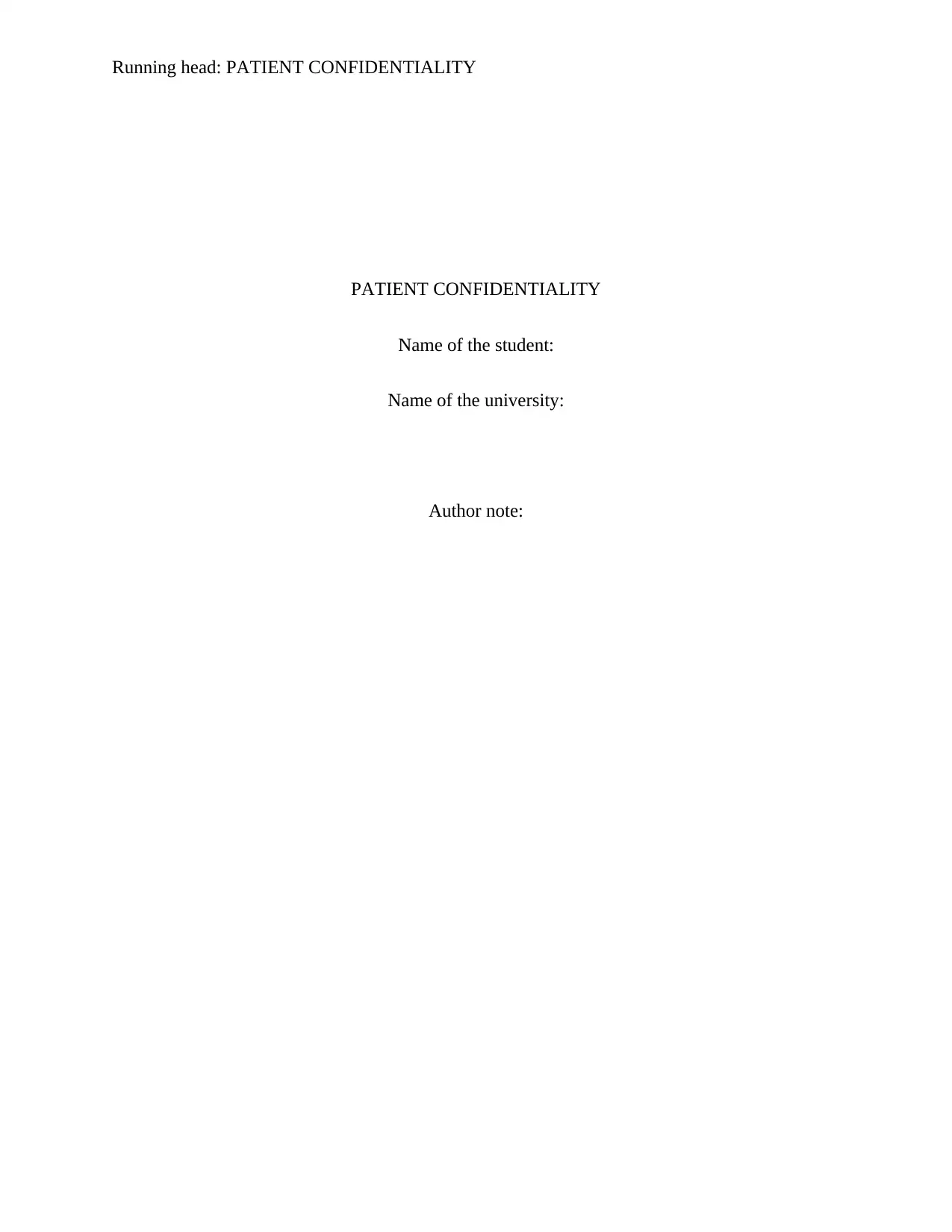
Running head: PATIENT CONFIDENTIALITY
PATIENT CONFIDENTIALITY
Name of the student:
Name of the university:
Author note:
PATIENT CONFIDENTIALITY
Name of the student:
Name of the university:
Author note:
Paraphrase This Document
Need a fresh take? Get an instant paraphrase of this document with our AI Paraphraser
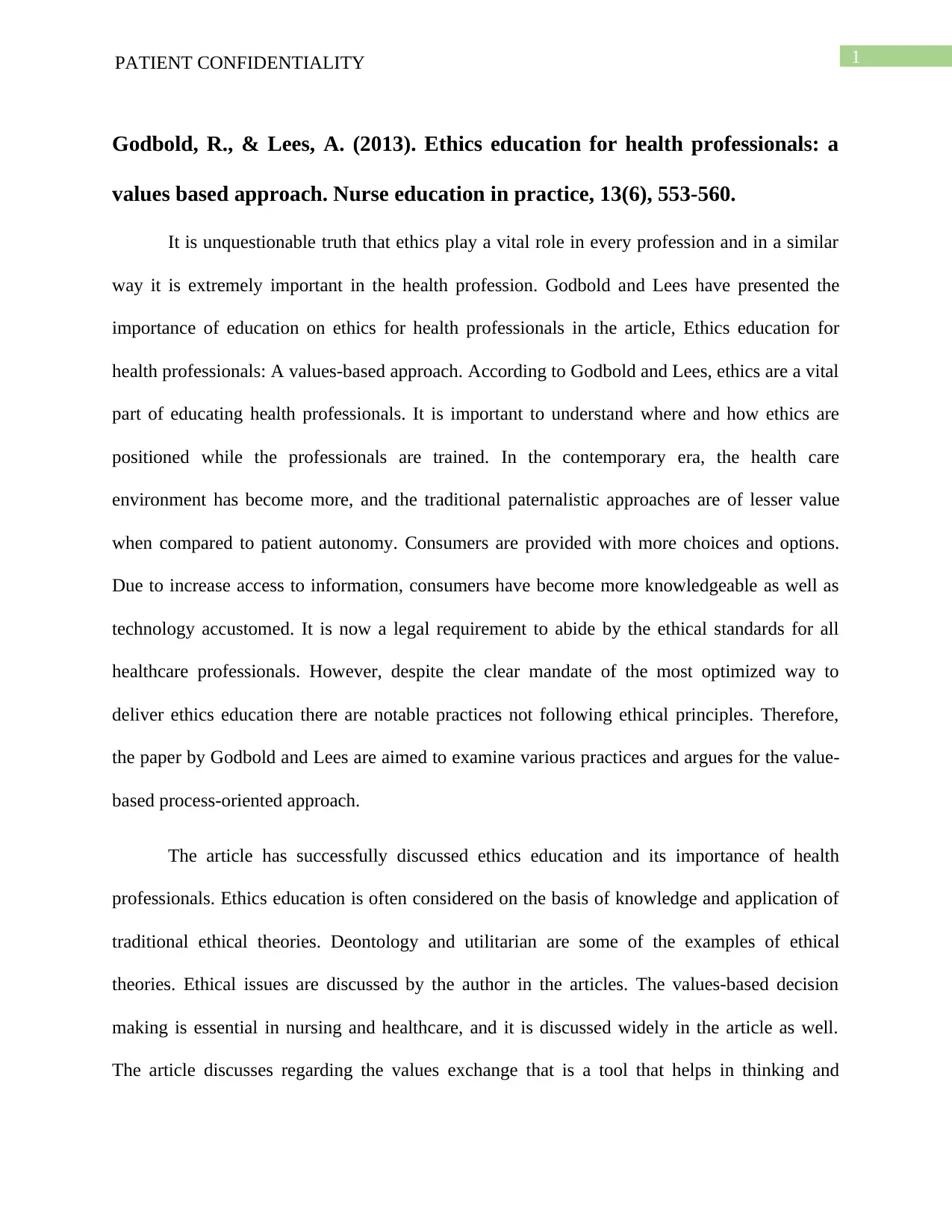
1PATIENT CONFIDENTIALITY
Godbold, R., & Lees, A. (2013). Ethics education for health professionals: a
values based approach. Nurse education in practice, 13(6), 553-560.
It is unquestionable truth that ethics play a vital role in every profession and in a similar
way it is extremely important in the health profession. Godbold and Lees have presented the
importance of education on ethics for health professionals in the article, Ethics education for
health professionals: A values-based approach. According to Godbold and Lees, ethics are a vital
part of educating health professionals. It is important to understand where and how ethics are
positioned while the professionals are trained. In the contemporary era, the health care
environment has become more, and the traditional paternalistic approaches are of lesser value
when compared to patient autonomy. Consumers are provided with more choices and options.
Due to increase access to information, consumers have become more knowledgeable as well as
technology accustomed. It is now a legal requirement to abide by the ethical standards for all
healthcare professionals. However, despite the clear mandate of the most optimized way to
deliver ethics education there are notable practices not following ethical principles. Therefore,
the paper by Godbold and Lees are aimed to examine various practices and argues for the value-
based process-oriented approach.
The article has successfully discussed ethics education and its importance of health
professionals. Ethics education is often considered on the basis of knowledge and application of
traditional ethical theories. Deontology and utilitarian are some of the examples of ethical
theories. Ethical issues are discussed by the author in the articles. The values-based decision
making is essential in nursing and healthcare, and it is discussed widely in the article as well.
The article discusses regarding the values exchange that is a tool that helps in thinking and
Godbold, R., & Lees, A. (2013). Ethics education for health professionals: a
values based approach. Nurse education in practice, 13(6), 553-560.
It is unquestionable truth that ethics play a vital role in every profession and in a similar
way it is extremely important in the health profession. Godbold and Lees have presented the
importance of education on ethics for health professionals in the article, Ethics education for
health professionals: A values-based approach. According to Godbold and Lees, ethics are a vital
part of educating health professionals. It is important to understand where and how ethics are
positioned while the professionals are trained. In the contemporary era, the health care
environment has become more, and the traditional paternalistic approaches are of lesser value
when compared to patient autonomy. Consumers are provided with more choices and options.
Due to increase access to information, consumers have become more knowledgeable as well as
technology accustomed. It is now a legal requirement to abide by the ethical standards for all
healthcare professionals. However, despite the clear mandate of the most optimized way to
deliver ethics education there are notable practices not following ethical principles. Therefore,
the paper by Godbold and Lees are aimed to examine various practices and argues for the value-
based process-oriented approach.
The article has successfully discussed ethics education and its importance of health
professionals. Ethics education is often considered on the basis of knowledge and application of
traditional ethical theories. Deontology and utilitarian are some of the examples of ethical
theories. Ethical issues are discussed by the author in the articles. The values-based decision
making is essential in nursing and healthcare, and it is discussed widely in the article as well.
The article discusses regarding the values exchange that is a tool that helps in thinking and
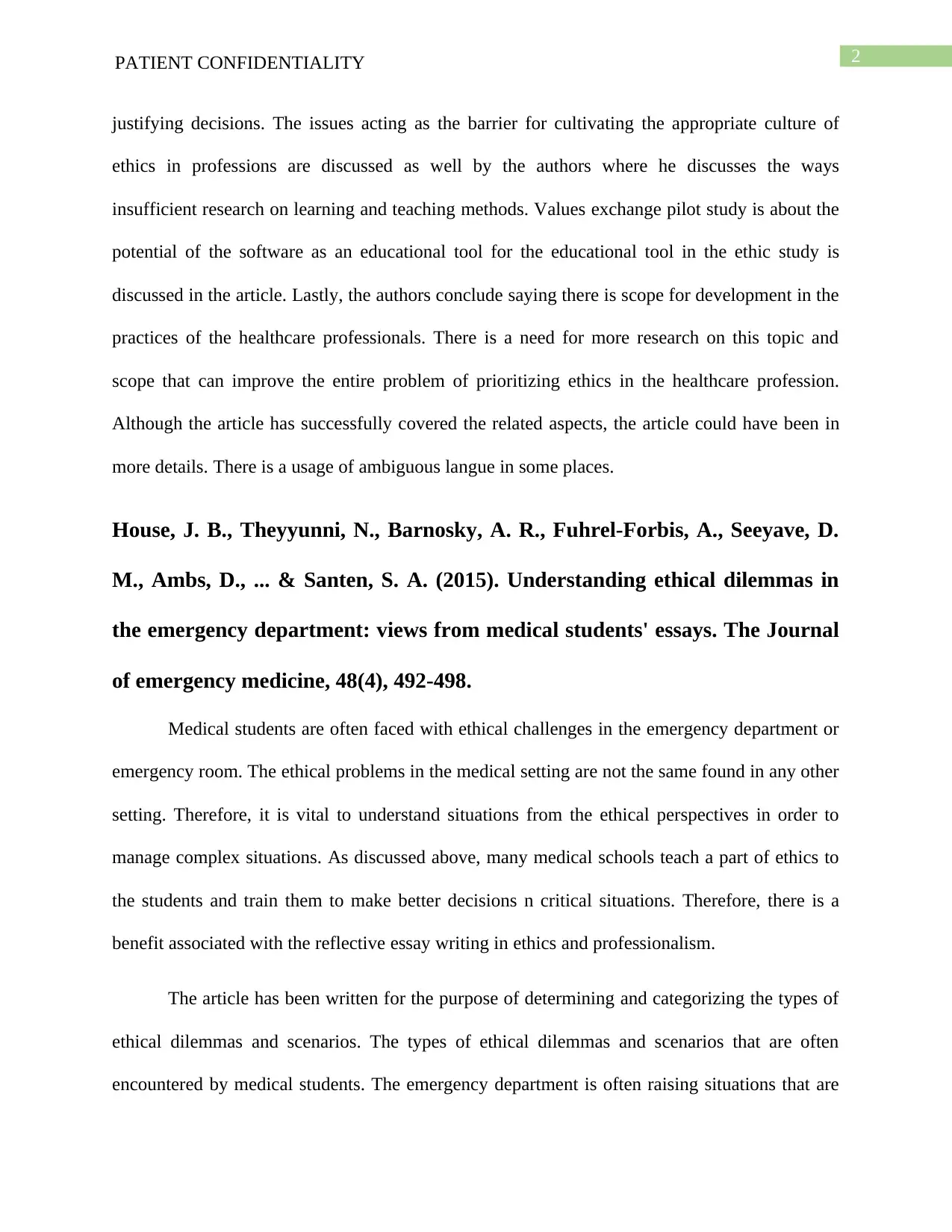
2PATIENT CONFIDENTIALITY
justifying decisions. The issues acting as the barrier for cultivating the appropriate culture of
ethics in professions are discussed as well by the authors where he discusses the ways
insufficient research on learning and teaching methods. Values exchange pilot study is about the
potential of the software as an educational tool for the educational tool in the ethic study is
discussed in the article. Lastly, the authors conclude saying there is scope for development in the
practices of the healthcare professionals. There is a need for more research on this topic and
scope that can improve the entire problem of prioritizing ethics in the healthcare profession.
Although the article has successfully covered the related aspects, the article could have been in
more details. There is a usage of ambiguous langue in some places.
House, J. B., Theyyunni, N., Barnosky, A. R., Fuhrel-Forbis, A., Seeyave, D.
M., Ambs, D., ... & Santen, S. A. (2015). Understanding ethical dilemmas in
the emergency department: views from medical students' essays. The Journal
of emergency medicine, 48(4), 492-498.
Medical students are often faced with ethical challenges in the emergency department or
emergency room. The ethical problems in the medical setting are not the same found in any other
setting. Therefore, it is vital to understand situations from the ethical perspectives in order to
manage complex situations. As discussed above, many medical schools teach a part of ethics to
the students and train them to make better decisions n critical situations. Therefore, there is a
benefit associated with the reflective essay writing in ethics and professionalism.
The article has been written for the purpose of determining and categorizing the types of
ethical dilemmas and scenarios. The types of ethical dilemmas and scenarios that are often
encountered by medical students. The emergency department is often raising situations that are
justifying decisions. The issues acting as the barrier for cultivating the appropriate culture of
ethics in professions are discussed as well by the authors where he discusses the ways
insufficient research on learning and teaching methods. Values exchange pilot study is about the
potential of the software as an educational tool for the educational tool in the ethic study is
discussed in the article. Lastly, the authors conclude saying there is scope for development in the
practices of the healthcare professionals. There is a need for more research on this topic and
scope that can improve the entire problem of prioritizing ethics in the healthcare profession.
Although the article has successfully covered the related aspects, the article could have been in
more details. There is a usage of ambiguous langue in some places.
House, J. B., Theyyunni, N., Barnosky, A. R., Fuhrel-Forbis, A., Seeyave, D.
M., Ambs, D., ... & Santen, S. A. (2015). Understanding ethical dilemmas in
the emergency department: views from medical students' essays. The Journal
of emergency medicine, 48(4), 492-498.
Medical students are often faced with ethical challenges in the emergency department or
emergency room. The ethical problems in the medical setting are not the same found in any other
setting. Therefore, it is vital to understand situations from the ethical perspectives in order to
manage complex situations. As discussed above, many medical schools teach a part of ethics to
the students and train them to make better decisions n critical situations. Therefore, there is a
benefit associated with the reflective essay writing in ethics and professionalism.
The article has been written for the purpose of determining and categorizing the types of
ethical dilemmas and scenarios. The types of ethical dilemmas and scenarios that are often
encountered by medical students. The emergency department is often raising situations that are
⊘ This is a preview!⊘
Do you want full access?
Subscribe today to unlock all pages.

Trusted by 1+ million students worldwide
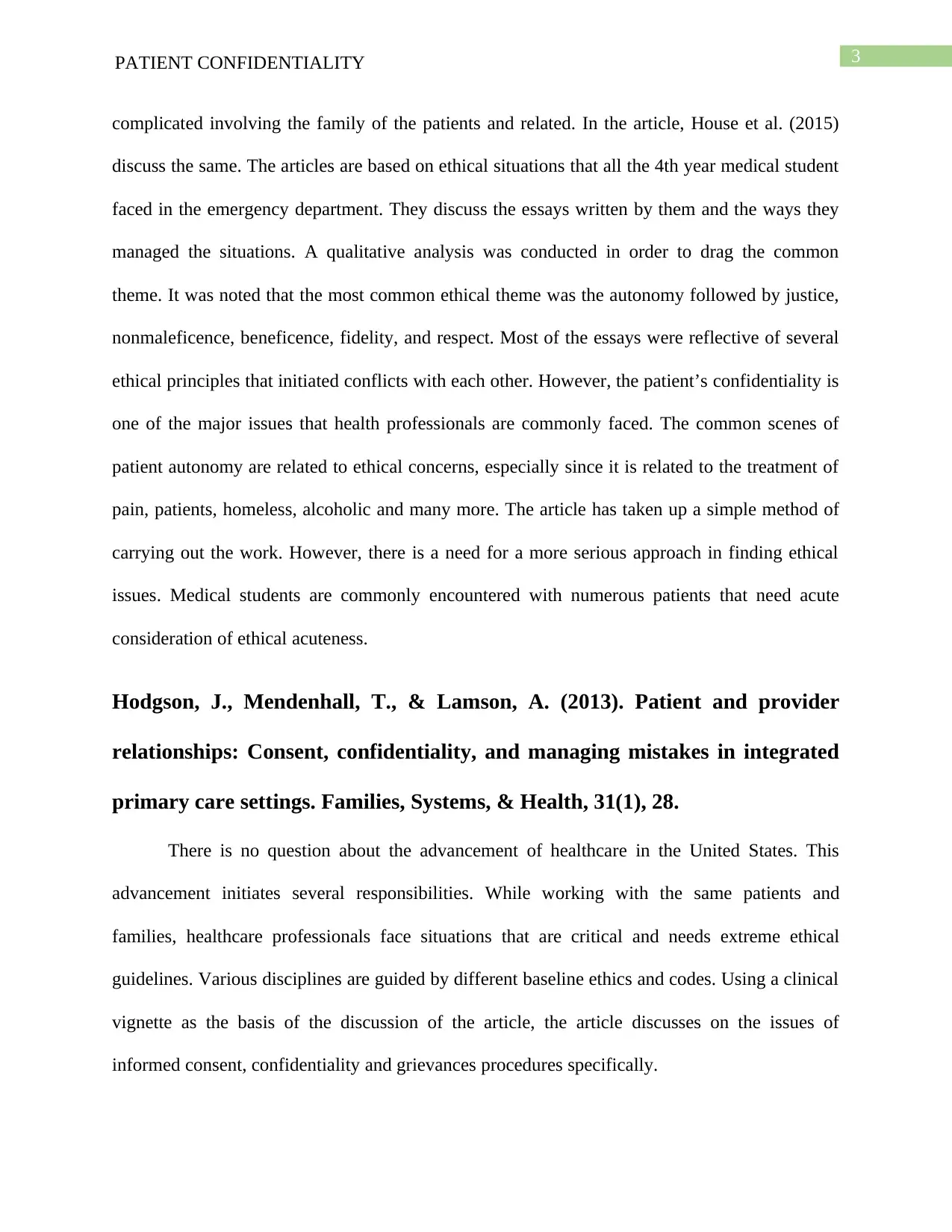
3PATIENT CONFIDENTIALITY
complicated involving the family of the patients and related. In the article, House et al. (2015)
discuss the same. The articles are based on ethical situations that all the 4th year medical student
faced in the emergency department. They discuss the essays written by them and the ways they
managed the situations. A qualitative analysis was conducted in order to drag the common
theme. It was noted that the most common ethical theme was the autonomy followed by justice,
nonmaleficence, beneficence, fidelity, and respect. Most of the essays were reflective of several
ethical principles that initiated conflicts with each other. However, the patient’s confidentiality is
one of the major issues that health professionals are commonly faced. The common scenes of
patient autonomy are related to ethical concerns, especially since it is related to the treatment of
pain, patients, homeless, alcoholic and many more. The article has taken up a simple method of
carrying out the work. However, there is a need for a more serious approach in finding ethical
issues. Medical students are commonly encountered with numerous patients that need acute
consideration of ethical acuteness.
Hodgson, J., Mendenhall, T., & Lamson, A. (2013). Patient and provider
relationships: Consent, confidentiality, and managing mistakes in integrated
primary care settings. Families, Systems, & Health, 31(1), 28.
There is no question about the advancement of healthcare in the United States. This
advancement initiates several responsibilities. While working with the same patients and
families, healthcare professionals face situations that are critical and needs extreme ethical
guidelines. Various disciplines are guided by different baseline ethics and codes. Using a clinical
vignette as the basis of the discussion of the article, the article discusses on the issues of
informed consent, confidentiality and grievances procedures specifically.
complicated involving the family of the patients and related. In the article, House et al. (2015)
discuss the same. The articles are based on ethical situations that all the 4th year medical student
faced in the emergency department. They discuss the essays written by them and the ways they
managed the situations. A qualitative analysis was conducted in order to drag the common
theme. It was noted that the most common ethical theme was the autonomy followed by justice,
nonmaleficence, beneficence, fidelity, and respect. Most of the essays were reflective of several
ethical principles that initiated conflicts with each other. However, the patient’s confidentiality is
one of the major issues that health professionals are commonly faced. The common scenes of
patient autonomy are related to ethical concerns, especially since it is related to the treatment of
pain, patients, homeless, alcoholic and many more. The article has taken up a simple method of
carrying out the work. However, there is a need for a more serious approach in finding ethical
issues. Medical students are commonly encountered with numerous patients that need acute
consideration of ethical acuteness.
Hodgson, J., Mendenhall, T., & Lamson, A. (2013). Patient and provider
relationships: Consent, confidentiality, and managing mistakes in integrated
primary care settings. Families, Systems, & Health, 31(1), 28.
There is no question about the advancement of healthcare in the United States. This
advancement initiates several responsibilities. While working with the same patients and
families, healthcare professionals face situations that are critical and needs extreme ethical
guidelines. Various disciplines are guided by different baseline ethics and codes. Using a clinical
vignette as the basis of the discussion of the article, the article discusses on the issues of
informed consent, confidentiality and grievances procedures specifically.
Paraphrase This Document
Need a fresh take? Get an instant paraphrase of this document with our AI Paraphraser
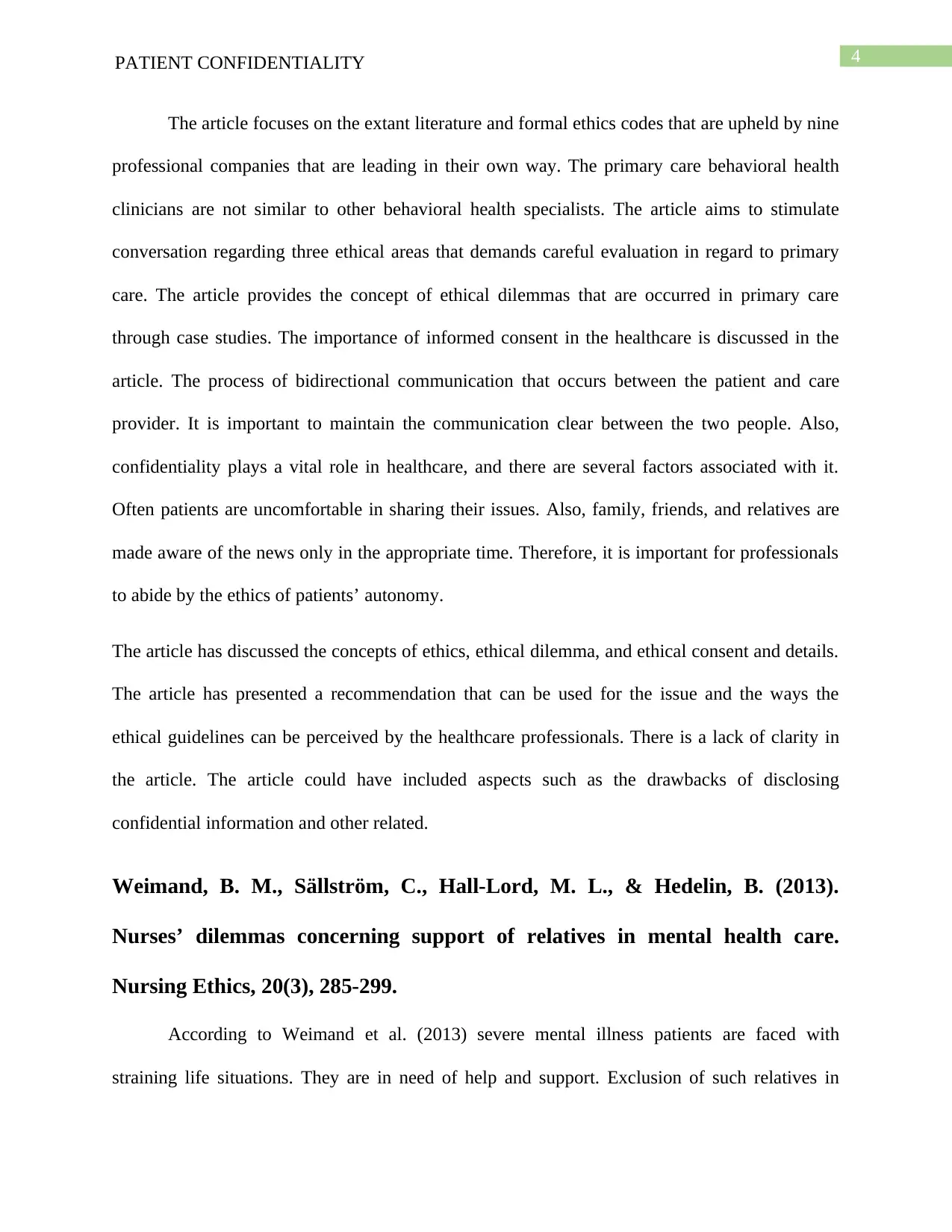
4PATIENT CONFIDENTIALITY
The article focuses on the extant literature and formal ethics codes that are upheld by nine
professional companies that are leading in their own way. The primary care behavioral health
clinicians are not similar to other behavioral health specialists. The article aims to stimulate
conversation regarding three ethical areas that demands careful evaluation in regard to primary
care. The article provides the concept of ethical dilemmas that are occurred in primary care
through case studies. The importance of informed consent in the healthcare is discussed in the
article. The process of bidirectional communication that occurs between the patient and care
provider. It is important to maintain the communication clear between the two people. Also,
confidentiality plays a vital role in healthcare, and there are several factors associated with it.
Often patients are uncomfortable in sharing their issues. Also, family, friends, and relatives are
made aware of the news only in the appropriate time. Therefore, it is important for professionals
to abide by the ethics of patients’ autonomy.
The article has discussed the concepts of ethics, ethical dilemma, and ethical consent and details.
The article has presented a recommendation that can be used for the issue and the ways the
ethical guidelines can be perceived by the healthcare professionals. There is a lack of clarity in
the article. The article could have included aspects such as the drawbacks of disclosing
confidential information and other related.
Weimand, B. M., Sällström, C., Hall-Lord, M. L., & Hedelin, B. (2013).
Nurses’ dilemmas concerning support of relatives in mental health care.
Nursing Ethics, 20(3), 285-299.
According to Weimand et al. (2013) severe mental illness patients are faced with
straining life situations. They are in need of help and support. Exclusion of such relatives in
The article focuses on the extant literature and formal ethics codes that are upheld by nine
professional companies that are leading in their own way. The primary care behavioral health
clinicians are not similar to other behavioral health specialists. The article aims to stimulate
conversation regarding three ethical areas that demands careful evaluation in regard to primary
care. The article provides the concept of ethical dilemmas that are occurred in primary care
through case studies. The importance of informed consent in the healthcare is discussed in the
article. The process of bidirectional communication that occurs between the patient and care
provider. It is important to maintain the communication clear between the two people. Also,
confidentiality plays a vital role in healthcare, and there are several factors associated with it.
Often patients are uncomfortable in sharing their issues. Also, family, friends, and relatives are
made aware of the news only in the appropriate time. Therefore, it is important for professionals
to abide by the ethics of patients’ autonomy.
The article has discussed the concepts of ethics, ethical dilemma, and ethical consent and details.
The article has presented a recommendation that can be used for the issue and the ways the
ethical guidelines can be perceived by the healthcare professionals. There is a lack of clarity in
the article. The article could have included aspects such as the drawbacks of disclosing
confidential information and other related.
Weimand, B. M., Sällström, C., Hall-Lord, M. L., & Hedelin, B. (2013).
Nurses’ dilemmas concerning support of relatives in mental health care.
Nursing Ethics, 20(3), 285-299.
According to Weimand et al. (2013) severe mental illness patients are faced with
straining life situations. They are in need of help and support. Exclusion of such relatives in
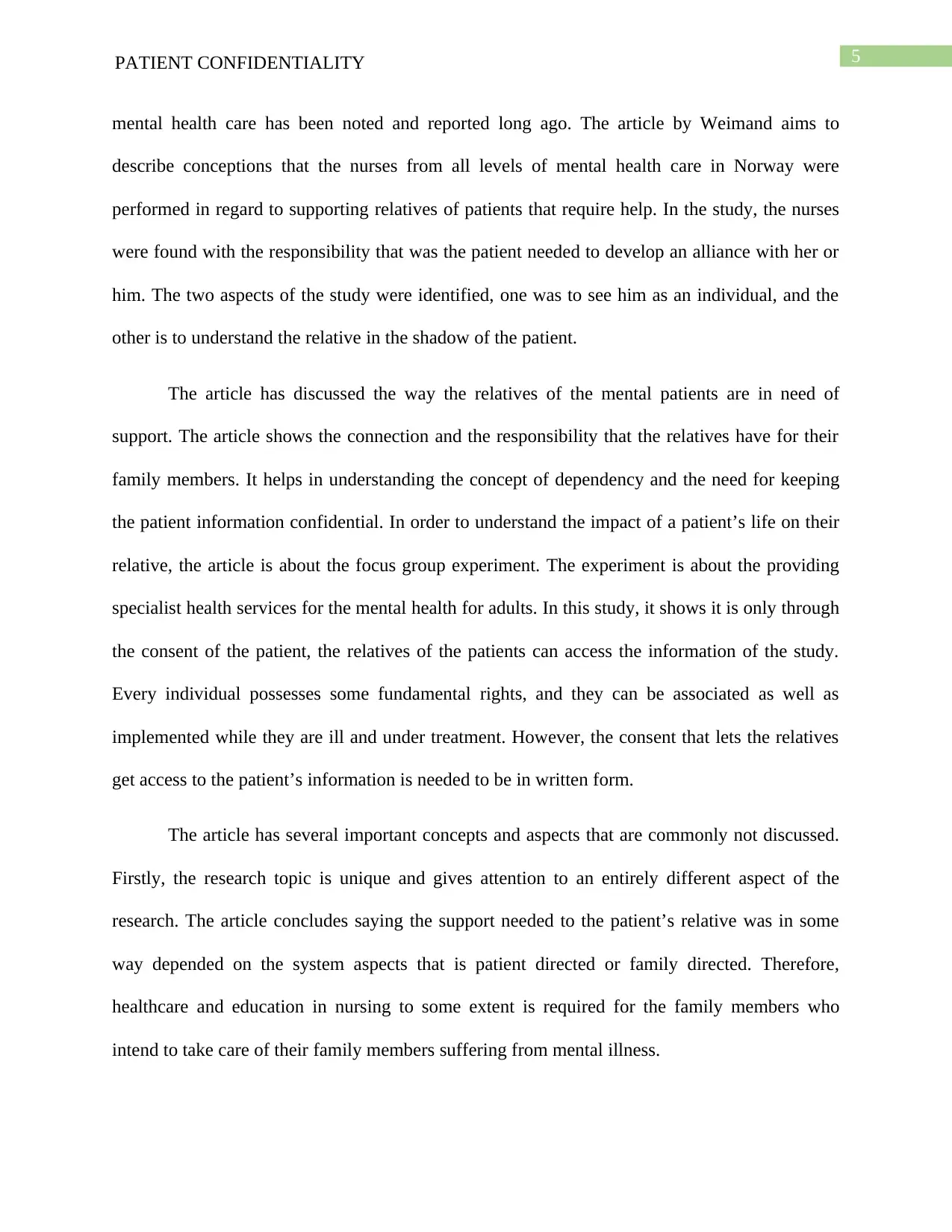
5PATIENT CONFIDENTIALITY
mental health care has been noted and reported long ago. The article by Weimand aims to
describe conceptions that the nurses from all levels of mental health care in Norway were
performed in regard to supporting relatives of patients that require help. In the study, the nurses
were found with the responsibility that was the patient needed to develop an alliance with her or
him. The two aspects of the study were identified, one was to see him as an individual, and the
other is to understand the relative in the shadow of the patient.
The article has discussed the way the relatives of the mental patients are in need of
support. The article shows the connection and the responsibility that the relatives have for their
family members. It helps in understanding the concept of dependency and the need for keeping
the patient information confidential. In order to understand the impact of a patient’s life on their
relative, the article is about the focus group experiment. The experiment is about the providing
specialist health services for the mental health for adults. In this study, it shows it is only through
the consent of the patient, the relatives of the patients can access the information of the study.
Every individual possesses some fundamental rights, and they can be associated as well as
implemented while they are ill and under treatment. However, the consent that lets the relatives
get access to the patient’s information is needed to be in written form.
The article has several important concepts and aspects that are commonly not discussed.
Firstly, the research topic is unique and gives attention to an entirely different aspect of the
research. The article concludes saying the support needed to the patient’s relative was in some
way depended on the system aspects that is patient directed or family directed. Therefore,
healthcare and education in nursing to some extent is required for the family members who
intend to take care of their family members suffering from mental illness.
mental health care has been noted and reported long ago. The article by Weimand aims to
describe conceptions that the nurses from all levels of mental health care in Norway were
performed in regard to supporting relatives of patients that require help. In the study, the nurses
were found with the responsibility that was the patient needed to develop an alliance with her or
him. The two aspects of the study were identified, one was to see him as an individual, and the
other is to understand the relative in the shadow of the patient.
The article has discussed the way the relatives of the mental patients are in need of
support. The article shows the connection and the responsibility that the relatives have for their
family members. It helps in understanding the concept of dependency and the need for keeping
the patient information confidential. In order to understand the impact of a patient’s life on their
relative, the article is about the focus group experiment. The experiment is about the providing
specialist health services for the mental health for adults. In this study, it shows it is only through
the consent of the patient, the relatives of the patients can access the information of the study.
Every individual possesses some fundamental rights, and they can be associated as well as
implemented while they are ill and under treatment. However, the consent that lets the relatives
get access to the patient’s information is needed to be in written form.
The article has several important concepts and aspects that are commonly not discussed.
Firstly, the research topic is unique and gives attention to an entirely different aspect of the
research. The article concludes saying the support needed to the patient’s relative was in some
way depended on the system aspects that is patient directed or family directed. Therefore,
healthcare and education in nursing to some extent is required for the family members who
intend to take care of their family members suffering from mental illness.
⊘ This is a preview!⊘
Do you want full access?
Subscribe today to unlock all pages.

Trusted by 1+ million students worldwide
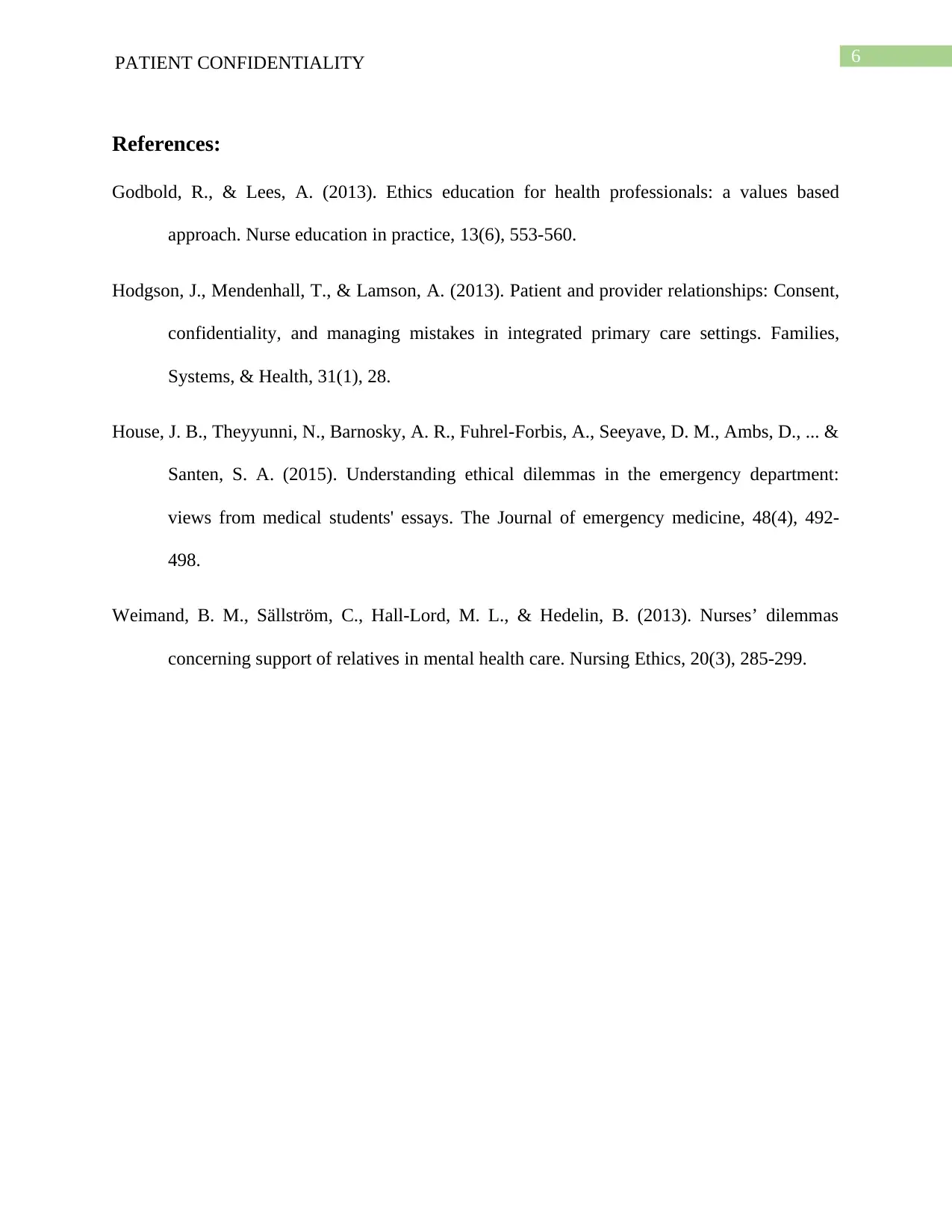
6PATIENT CONFIDENTIALITY
References:
Godbold, R., & Lees, A. (2013). Ethics education for health professionals: a values based
approach. Nurse education in practice, 13(6), 553-560.
Hodgson, J., Mendenhall, T., & Lamson, A. (2013). Patient and provider relationships: Consent,
confidentiality, and managing mistakes in integrated primary care settings. Families,
Systems, & Health, 31(1), 28.
House, J. B., Theyyunni, N., Barnosky, A. R., Fuhrel-Forbis, A., Seeyave, D. M., Ambs, D., ... &
Santen, S. A. (2015). Understanding ethical dilemmas in the emergency department:
views from medical students' essays. The Journal of emergency medicine, 48(4), 492-
498.
Weimand, B. M., Sällström, C., Hall-Lord, M. L., & Hedelin, B. (2013). Nurses’ dilemmas
concerning support of relatives in mental health care. Nursing Ethics, 20(3), 285-299.
References:
Godbold, R., & Lees, A. (2013). Ethics education for health professionals: a values based
approach. Nurse education in practice, 13(6), 553-560.
Hodgson, J., Mendenhall, T., & Lamson, A. (2013). Patient and provider relationships: Consent,
confidentiality, and managing mistakes in integrated primary care settings. Families,
Systems, & Health, 31(1), 28.
House, J. B., Theyyunni, N., Barnosky, A. R., Fuhrel-Forbis, A., Seeyave, D. M., Ambs, D., ... &
Santen, S. A. (2015). Understanding ethical dilemmas in the emergency department:
views from medical students' essays. The Journal of emergency medicine, 48(4), 492-
498.
Weimand, B. M., Sällström, C., Hall-Lord, M. L., & Hedelin, B. (2013). Nurses’ dilemmas
concerning support of relatives in mental health care. Nursing Ethics, 20(3), 285-299.
1 out of 7
Related Documents
Your All-in-One AI-Powered Toolkit for Academic Success.
+13062052269
info@desklib.com
Available 24*7 on WhatsApp / Email
![[object Object]](/_next/static/media/star-bottom.7253800d.svg)
Unlock your academic potential
Copyright © 2020–2025 A2Z Services. All Rights Reserved. Developed and managed by ZUCOL.





